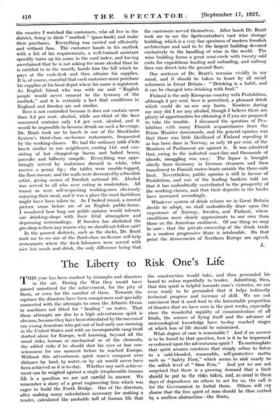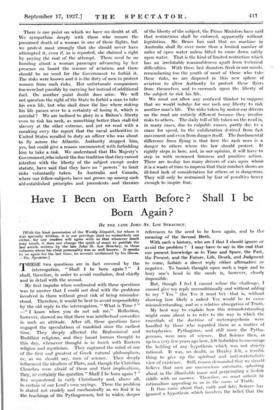The Liberty to Risk One's Life
THIS year has been marked by triumphs and disasters in the air. During the War they would have passed unnoticed for the achievement, for the pity of them, or even for the number of them. Towards the equinox the disasters have been conspicuous and specially connected with the attempts to cross the Atlantic Ocean in machines not fitted for " landing " on water. That these attempts are due to a high adventurous spirit is obvious, because they have been stimulated by the success of one young American who got out of bed early one morning in the United States and with an incomparable sang-froid started alone for Europe, well knowing, beyond all the usual risks, human or mechanical or of the elements, the added risks if he should shut his eyes or lose con- sciousness for one moment before he reached Europe. Without this adventurous spirit man's conquest over distance by land, by water, or by air would never have been achieved as it is to-day. Whether any such achieve- ment can be weighed against a single irreplaceable human life is a question we are not careful to answer. We remember a story of a great engineering firm which was eager to build the Forth Bridge. One of the directors, after making many calculations necessary for making a tender, calculated the probable toll of human life that the construction would take, and then persuaded his board to refuse regretfully to tender. Admitting, then, that this spirit is helpful towards man's victories, we are even ready to be persuaded that it helps indirectly technical progress and increase of skill. We are not convinced that it need lead to the lamentable proportion of disaster that we have seen in the past weeks, especially since the wonderful rapidity of communication of all kinds, the science of flying itself and the advance of meteorological knowledge have to-day reached stages at which loss of life should be minimized.
What degree of care is reasonable ? And if an answer is to be found to that question, how is it to be impressed or enforced upon the adventurous spirit ? To contemplate that spirit arouses emotions that simply refuse to listen to a cold-blooded, reasonable, self-protective motto such as "Safety First," which seems to sink nearly to the selfish level of "Sian Fein." And yet we are not surprised that there is a growing demand that a limit should be put to the risks taken, and, as usual in these days of dependence on others to act for us, the call is for the Government to forbid them. Others will cry shame that the free spirit of man should be thus curbed by a soulless abstraction—the State, • -There is one point on which we have no doubt at all. We sympathize deeply with those who mourn the presumed death of a woman in one of these flights, but we protest most strongly that she should never have attempted it, even if, as is reported, she claimed a right by paying the cost of the attempt. There need be no humbug about a woman passenger advancing by her Presence on board the science of aviation, and there should be no need for the Government to forbid it. The risks were known and it is the duty of men to protect women from such risks. Her unfortunate companions too were lost possibly by carrying her instead of additional f uel. On another point doubt does arise. We will not question the right of the State to forbid a man to take his own life, but who shall draw the line where risking his life passes over to a certainty of losing it, which is suicidal ? We are inclined to glory in a Briton's liberty even to risk his neck, as something better than stall-fed slavery at the other extreme, and yet we read with a sneaking envy the report that the naval authorities in United States recalled to duty an officer who was about to fly across the Atlantic. Authority stopped him, yes, but could give a reason unconnected with forbidding him to take a risk. We understand that His Majesty's Government,who inherit the fine tradition that they cannot interfere with the liberty of the subject except under statute, have said that they have no " powers " to limit risks voluntarily taken. In Australia and Canada, where our fellow-subjects have not grown up among such old-established principles and precedents and theories of the liberty of the subject, the Prime Ministers have said that restrictions shall be enforced, apparently without legislation. Mr. •Bruce has said that no machine in Australia shall fly over more than a limited number of miles of open water unless fitted to come down safely upon water. That is the kind of limited restriction which has an irrefutable reasonableness apart from technical difficulties. With these last disasters fresh in our minds, remembering too the youth of most of those who take these risks, we are disposed in this new sphere of aviation to allow Authority to protect these flyers from themselves and to encroach upon the liberty of the subject to risk his life.
We must not allow any confused thinker to suppose that we would indulge for one inch any liberty to risk another man's life. The risks taken by motor-ear drivers on the road are entirely different because they involve risks to others. The daily toll of life taken on the road is, in many cases, due to culpable causes, partly due to a craze for speed, to the exhilaration derived from fast movement and even from danger itself. The fundamental difference from flying is that here the rash man is a danger to others whom the law should protect. It rightly steps in here, and, in our opinion, it will have to step in with increased firmness and punitive action. There are to-day too many drivers of cars upon whom it is a waste of time to impress that their conduct shows an ill-bred lack of consideration for others or is dangerous. They will only be restrained by fear of penalties heavy enough to inspire fear.















































 Previous page
Previous page